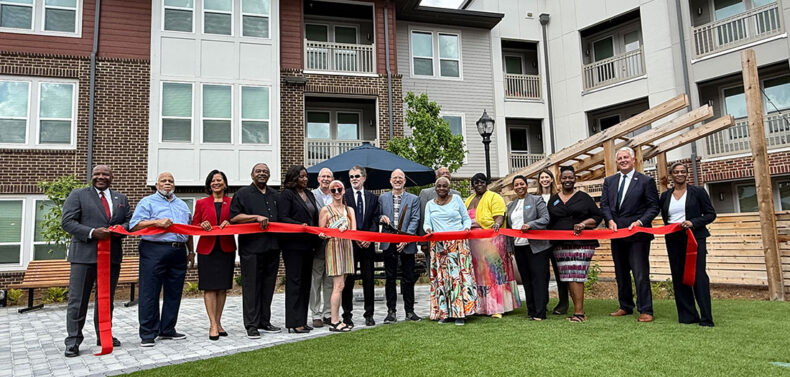Athens-Clarke County has poured tens of millions of dollars into affordable housing in recent years, but is still thousands of units short.
About 8,800 renter households in Athens are “cost burdened,” according to the ACC Housing and Community Development Department. Almost all of them make less than $35,000 a year.
“We can assume it may be a little higher, or it may be a little lower because a couple of developments have come online,” HCD Director Melinda Lord told the ACC Commission during an Aug. 12 work session.
The county spent an unprecedented $45 million in local sales tax dollars on The View at NoDA, the mixed-income development that’s replacing Section 8 apartment complex Bethel Midtown Village. Construction will start on the second phase soon, pending commission approval in September. Federal Low-Income Housing Tax Credits (LIHTC, pronounced “lie tech”) are also subsidizing the project, along with three other affordable housing projects in the pipeline: Athens Flats near U.S. Highway 29 North, Lexington Flats near the airport and Classic City Heights on Atlanta Highway.
But LIHTC subsidies, distributed by the Georgia Department of Community Affairs, are hard to get, especially for first-time applicants or those without an existing relationship with the Athens Housing Authority (a locally appointed board that oversees federally funded public housing in Athens). Over the past two years, the commission has allocated $6.5 million to a housing fund that could be used to acquire property, provide gap financing for rental projects or build single-family homes. A low-interest revolving loan program could encourage DCA to approve more LIHTC projects for Athens, Lord said.
“That’s where your biggest number of affordable rental units is going to come from, is LIHTC,” she said. “Once that [loan] money starts going out there and coming back, we’ll be able to entice private developers, maybe without LIHTC.”
ACC is also setting up a land bank authority that can clear property titles, conduct friendly condemnations, and identify and sell unused county property for affordable housing.
For low-income homebuyers, the commission gave $718,000 to First American Bank and Trust for down payment assistance, which is expected to be gone by the end of next year. The county also uses federal block grants for housing and social services to fund home repair programs and nonprofit affordable housing developers like the Athens Land Trust, East Athens Development Corp. and Habitat for Humanity. The money doesn’t go far, though—it takes at least a $300,000 subsidy to build a home that’s affordable for a family making 60% of the area median income (AMI) as defined by the U.S. Department of Housing and Urban Development, which ranges from $35,000 for a single person to $80,000 for a large family. HCD likes to “stack” subsidies so that a home sells for $150,000 rather than $200,000, “which is a lot more affordable for a lower-income family,” according to Lord.
The enormous gap between market rates and what a lower-income family can afford makes the problem almost intractable for the local government to handle alone.
“If I’m correct, if we’re trying to meet the [8,800], it’s going to cost $1.6 billion,” Commissioner Patrick Davenport said, citing a previous county study.
“Yeah, that’s it,” Lord replied. “And it would take a long, long time.”
So, getting private industry involved will be paramount.
“When you look at those numbers, it’s so huge, and one more thing is admirable and good, but it only takes a little bit of a bite, and the last thing people are wanting is for us to all have government-funded housing,” Commissioner Carol Myers said.
Local governments can’t require landlords to register under state law, but ACC could offer incentives—a small tax break, perhaps—for registration to help code enforcement hold landlords accountable.
“When you think about some of our naturally occurring affordable housing, it’s not great,” Lord said, referring to older, run-down rental properties. “I mean, it’s just not nice. It’s not what I would want anyone to live in.”
The commission could also “recalibrate” its inclusionary zoning ordinance so that more developers take advantage of it, Lord recommended. The ordinance gives density bonuses or relief from parking requirements for private developers who make a percentage of their units affordable or contribute to the housing fund.
“Of course, they’re in the business to make money, and we understand that, so we’ve got to figure out a way to make it worth their while to develop not only market-rate housing, but affordable housing as well,” Lord said.
CCSD Starts Superintendent Search
The Clarke County Board of Education voted Aug. 14 to hire the Georgia School Board Association to conduct a nationwide search for a new superintendent, although the early favorite appears to be Jennifer Scott, the retired Robbie Hooker’s chief of staff who is now serving as interim superintendent.
Board President Mumbi Anderson and Vice President Mark Evans spoke in favor of continuity as the Clarke County School District is in the midst of implementing Hooker and Scott’s five-year plan that made major changes to literacy education. “As a public health professional and now an educator, one of the failures in our public infrastructure is that we give up on a bright idea when we don’t see results,” Anderson said. “It’s been two years, and now we want to consider changing course and starting all over.”
The board opted to run the search itself in 2022, which board member Patricia Yager called “chaos.” That search ended with the selection of Hooker, a former CCSD principal who was then serving as superintendent in Social Circle.
“There’s no way I’m going to do that again. No way,” said Yager, a marine science professor at UGA who studies melting polar icecaps. “I went to Antarctica for three months and came back, and it was still in chaos. No, we should not do that. We need to get someone with structure and framework.”
The board also voted to name Cedar Shoals High School’s baseball field after the late coach James Holsten.
ADDA Lights Up Downtown
Taking a page out of the Clark Griswold playbook, the Athens Downtown Development Authority will step up its holiday lights game this winter.
The ADDA board of directors voted Aug. 13 to hire a contractor to light up parts of Clayton Street and College Avenue from mid-November into January, at a cost that will likely come to about $200,000, according to estimates and quotes gathered by landscape architect Josh Koons. The board had previously asked him to look into options for stepped-up holiday decorations that would attract more shoppers.
While the price may seem high, the going rate for one tree wrap is more than $1,000. “If you’re not familiar with light shows of this magnitude, they cost a lot, and it sometimes surprises you,” Koons said.
At least for 2025, the ADDA will rent the lights, which makes the contractor responsible for putting them up, taking them down and replacing broken bulbs, and gives the ADDA the ability to change the design from year to year. The authority will cover the cost out of its reserve funds, but could wind up making some money off parking fees, co-director Linda Ford said.
The Athens-Clarke County Central Services Department traditionally decorates the downtown streetscape, but what the ADDA has in mind is bigger and brighter, closer to the State Botanical Garden’s holiday lights. Central Services will be asked to focus on the block of Washington Street in front of the 40 Watt Club.
Like what you just read? Support Flagpole by making a donation today. Every dollar you give helps fund our ongoing mission to provide Athens with quality, independent journalism.










